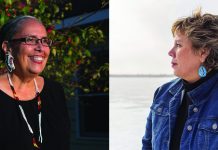
jozefmicic/Adobe
To say we’re living in divided times is like saying the Grand Canyon is a crack in the ground. Things are bad. The mutual hostility between the left and the right is metastasizing, becoming a pervasive energy of distrust, anger, and aggression. It permeates school board meetings, town halls, and social media. Underneath it all is a potent fear. According to a 2020 report from the Pew Research Center, nine in 10 voters on both the left and the right worry that a victory by the other side would lead to “lasting harm” to the country.
Enter Braver Angels, a national organization dedicated to uniting red and blue Americans in a working alliance to depolarize America.
In the wake of the contentious 2016 presidential election, Bill Doherty, a professor in the department of family social science at the University of Minnesota, connected with two of his colleagues in New York and Ohio. “People in their parts of the country were feeling very differently,” he says. “In Manhattan, it was like the world was ending, while in southwest Ohio, there was celebration.”
All three men worked in areas of marriage, relationships, and connection-building across divides. Wanting to apply their skills to the political landscape, they convened 10 Hillary Rodham Clinton voters and 10 Donald Trump voters in South Lebanon, Ohio, to facilitate a conversation. Doherty led the event that would become the first Braver Angels Red/Blue workshop in December 2016. “It was a very successful initial workshop,” he recalls. “We thought it would be a one-off, but we decided it had to continue.”
Doherty has since designed a range of workshops for Braver Angels, and the organization now boasts roughly 40,000 subscribers, with members in all 50 states. Minnesota is the “incubator state” for new workshops (since the pandemic, most workshops are hosted on Zoom). With roughly 2,750 members, Minnesota also features the most members per capita in the nation. Local alliances are cropping up in communities across the state, with members meeting digitally and in person at parks and libraries to discuss issues ranging from “political homelessness” to criminal justice reform.
Braver Angels workshops aim to emphasize the humanity and nuanced life experiences underlying people’s perspectives. “The Red/Blue workshop is a life-altering experience,” says Kim Martinson, co-coordinator for Braver Angels Minnesota. “People go, ‘I had no idea this is why you believe what you do.’”
Someone might talk about how their spouse’s job as a police officer informs their position on gun control, or how their childhood experiences underlie their opinion on food stamps. “People bring forth their stories, and others go, ‘Now I get it!’” Martinson says. “There’s always a light bulb that goes on.”
Part of the Red/Blue workshop involves a “fishbowl” exercise. Each “side” (red and blue) takes a turn talking among themselves, while the other side listens and learns. First, the members of the group inside the fishbowl discuss why their ideals and perspectives are good for the country. Next, they discuss their reservations and concerns about their own side. “That invites humility and self-criticism,” Doherty explains. “That helps soften the other side.”
At one Red/Blue workshop that Doherty led, an activist for the Democratic Party said that for the first time she understood not just what reds’ positions are, but why. “She said she got insight into their fears, values, and aspirations, and it changed her,” Doherty says. At another workshop, in Anoka, a red participant noted, “Neither side is going to defeat the other, so we’re going to have to figure out how to get along and run the country together.”
U.S. Rep. Dean Phillips (D-Minn., 3rd District) has participated in a number of Braver Angels workshops, both with voters in his Minnesota district and with some of his national colleagues as part of the congressional Problem Solvers Caucus. “Braver Angels workshops are the only place I’ve seen where people identify commonality in the course of a couple hours, often coming from very different political perspectives, and go quickly from antagonism to friendship,” he says. “It’s been one of the most rewarding parts of my job, to watch people come in with low expectations and leave inspired and optimistic.”
At one recent workshop in Phillips’ district, the representative recalls how the meeting concluded with participants summing up their experience: “One liberal woman said to a conservative, ‘When you drove up with a Trump sticker on your F-150, I almost turned around. Now I see that you’re a good guy.’ He said, ‘I thought the same when you drove up in your Prius!’ Then they embraced. That cemented my mission to keep inspiring moments like that.”
Braver Angels strives to maintain a balance between reds and blues. “One of the key decisions early on was that Braver Angels leadership at the national and state levels would be half red and half blue, and that all our offerings would be free,” Doherty says. But it can be a challenge to attract enough red members, particularly in urban areas.
“Blues gravitate toward dialogue across differences more than reds do,” Doherty notes. But when reds do attend Braver Angels workshops, they evaluate them just as highly as blues. “The challenge is simply getting them in the door.”
According to Doherty, blues can also be “quite judgmental about things.” But testimonials and word of mouth among reds who do participate can help attract others. Rick Hotchner, a red member of Braver Angels Minnesota, has found that reds tend to be suspicious of the organization, thinking it’s out to try to change their minds, or that people will pounce on them once they express themselves.
“I tell them I’ve had so many great conversations with liberals and progressives. They haven’t necessarily changed my mind, but they’ve opened my aperture,” Hotchner says.
The goal is not that all the participants end up in the same place, holding hands and singing kumbaya. It’s that Americans begin once again to occupy the same moral universe, instead of viewing each other as hostile foes. “So that when we compromise, as we must in a democracy, we don’t view it as giving in to the enemy,” Doherty says.
“Our greatest challenge is ignorance,” Phillips says. “We’re ignoring each other. The antidote is taking a step toward each other. If we all did that, around conference, picnic, and dining tables, we could make a world of difference. The truth is that we’re not nearly as divided as the entertainment industry wants us to believe.”
To learn more about Braver Angels Minnesota, click here.







